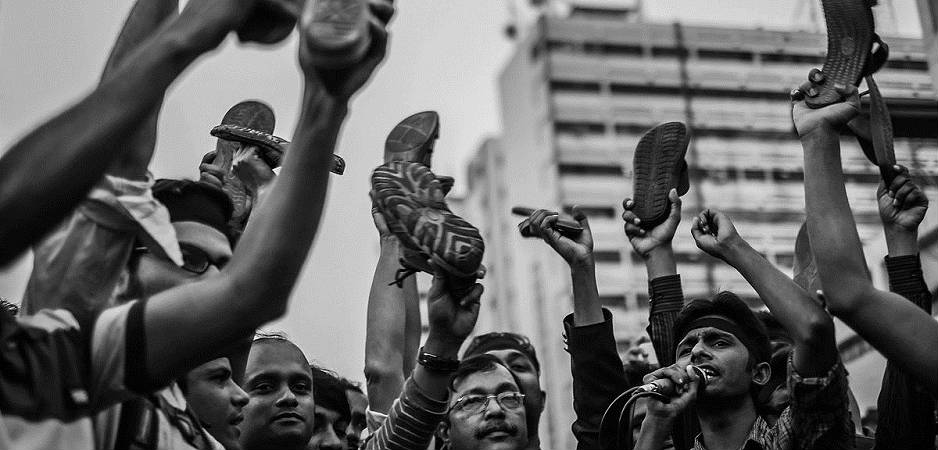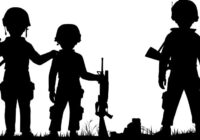The multilateral deal the world’s great powers have cut with Iran is wise, courageous and the right thing to do.
In a week blighted by tragedy and violence, there were two remarkably positive developments. First, the United States, Britain, France, Russia, China and Germany concluded a successful deal with Iran regarding its nuclear program. Second, in Nigeria, a democratic transition of power occurred after the president lost the election to the opposition candidate.
In the case of the Iran deal, US President Barack Obama is bang on the money when he says a “historic understanding” has been reached. In 1953, the US committed original sin in the Middle East by toppling Mohammad Mosaddegh, the first democratically elected leader of Iran. At the time, the Americans were paranoiac about the spread of communism. Mosaddegh had nationalized the Anglo-Iranian Oil Company (AIOC). This spooked Washington.
The reality is that nationalization was a measure of last resort for Mosaddegh. All he wanted was for AIOC, which is now British Petroleum, to give Iran the same deal that Aramco, an American company, had given Saudi Arabia. The Saudis were getting 50% of oil revenues in contrast to 16% in the case of Iran. For decades, Iran had been a de facto colony with the British dictating the course of events. They found Iran’s demand for a better deal to be an uppity claim by an undeserving vassal.
In 1951, Winston Churchill beat Clement Attlee, the Labour leader who had been prime minister since 1945. Churchill is a great hero for the British. For those who are not white, he is not quite the champion of freedom. In his view, the colonies had primitive cultures and were inhabited by inferior races. In 1913, as First Lord of the Admiralty, he had given AIOC its first break. He replaced coal with oil as the fuel for British ships, with AIOC supplying the oil. In 1923, Churchill was on the payroll of AIOC to lobby the British government. When he became prime minister again, he was adamant that AIOC interests had to be protected.
In Washington, the McCarthy era was in its heyday. There was a communist under every bush. Churchill was able to convince the Americans that Mosaddegh had to go. In 1953, the Central Intelligence Agency (CIA) obliged. Henceforth, the Shah would rule with CIA support, and SAVAK, his secret police, would destroy the secular opposition, paving the way for the rise of Ayatollah Ruhollah Khomeini.
The events of 1979 such as the hostage crisis are well-known. For 444 days, 52 Americans were held hostage in the US Embassy in Tehran. Since then, the Great Satan and the member of the Axis of Evil have had fraught relations. Each side has sinned mightily against the other. The Americans are guilty of supporting Saddam Hussein during the eight-year Iran-Iraq War in the 1980s, when the Iraqi ruler used chemical weapons with impunity. The Iranians hit back through Hezbollah, which bombed the US Embassy in Beirut in 1983. The vicious tit-for-tat has gone on for far too long.
After years of mistrust, the nuclear deal is the first one that has brought the US and Iran to some agreement. Already, it has enemies. Senator Tom Cotton’s Gang of 47 is having conniptions that Obama, with his shady African and Muslim roots, has kissed Iranian President Hassan Rouhani. Similarly, hard-liners in Iran are not too pleased. Israeli Prime Minister Binyamin “Bibi” Netanyahu called Obama and tweeted his opposition to the deal. Romeo and Juliet now have to convince Montagues and Capulets that the deal might actually work.
Haaretz, Israel’s oldest daily newspaper that began in 1918, declared that the nuclear framework agreement with Iran was not a bad deal. It points out that the agreement respects Iran’s objectives of continuing with its nuclear program and the lifting of sanctions, whilst giving the US in conjunction with other powers invasive oversight for years to come. As per the details released by the US State Department, the deal clips Iran’s nuclear weapons potential for the next two decades if not more.
The deal with Iran did not come a day too early in the context of what is going on in the Middle East. Yemen is going the way of Syria. After pitched street battles, Houthi rebels seized the presidential palace in Aden. Forces loyal to Abd-Rabbu Mansour Hadi, the exiled Yemeni president, and some of the local population are battling rebels. The Islamic State (IS) and al-Qaeda in the Arabian Peninsula (AQAP) are also active. The Saudis have launched Operation Decisive Storm with support from Egypt, Morocco, Jordan, Sudan, the United Arab Emirates, Kuwait, Qatar and Bahrain. Pakistan might also pitch in.
In the midst of madness, the Chinese navy showed up to rescue almost 600 Chinese citizens and 225 foreigners from Aden. For the first time in its history, the Chinese have rescued foreign nationals in a danger zone. This does not augur well for US command of the high seas and its domination of the world order.
The biggest threat to much of the world is not Iran, but non-state fundamentalist organizations such as al-Qaeda and the Islamic State. Needless to say, both these organizations were provided seed capital by Saudi Arabia. The Saudis have been pumping money around the world into madrassas (religious schools) to increase their influence. In the process, local heterodox traditions of Islam are being wrecked. Bangladesh is a case in point.
Recently, Avijit Roy, a liberal writer based in the US, was murdered while he was visiting Dhaka. This week, Washiqur Rahman, a blogger who had critiqued fundamentalist Islam on a liberal Bengali website, was hacked to death on a street in full view of onlookers. The murderers were students at a madrassa, one of the many where Saudi-sponsored poison is destroying the soul of a naturally syncretic society.
In Kenya, al-Shabab, an extremist Islamist group, killed 147 people and wounded 79 in an attack on Garissa University College. It is led by Ahmed Abdi Godane, a man wedded to the pure Salafi jihadist doctrine. Once, he trained with the Saudis of al-Qaeda in Afghanistan. Today, he sees hard-line Sunni Islam of the sort practiced in Saudi Arabia with flogging and beheadings as a solution to Somalia’s problems. As per al-Shabab, those killed or wounded are simply infidels who deserved to die. Kenya, Somalia and the rest of Africa have manifold problems, but the violent visions of Saudi-inspired Sunni Islamists prescribe a remedy worse than the disease.
Finally, a heartening development in Nigeria was a largely fair election followed by a peaceful transfer of power. President Goodluck Jonathan, in office since 2010, deservedly lost but, to his everlasting credit, he was quick to concede defeat. Muhammadu Buhari, a former general who ruled Nigeria 32 years ago, won. Then, he threw thousands in jail and throttled the press. He also kicked out 700,000 immigrants because of a hare-brained notion that this would create new jobs. Hopefully, Buhari has learned a thing or two since.
The new president is a Muslim from the north. This will take out some steam from Boko Haram. Many Muslims saw Jonathan as a Christian usurper, and they will have less reason to be riled up. It is unlikely that Buhari will make institutional reforms and restrain the kleptocratic elites that run Nigeria. The country needs fundamental reforms, but Buhari does not seem to be the man with the mettle to make them. Yet the peaceful transfer of power from Jonathan to Buhari is a positive development for Nigeria and Africa.
*[You can receive “The World This Week” directly in your inbox by subscribing to our mailing list. Simply visit Fair Observer and enter your email address in the space provided. Meanwhile, please find below five of our finest articles for the week.]
[seperator style=”style1″]The Middle East Reacts to the Iran Deal[/seperator]
The ripple effects of a nuclear deal between Iran and the P5+1 may instigate geopolitical waves in the Middle East.
It appears that after a 12-year impasse, Iran and the P5+1 — the United States, Britain, France, China, Russia and Germany — have reached an agreement on key parameters of a framework for a final nuclear deal, which would be hammered out by June 30. Though nothing is set in stone, the tentative accord reached on April 2 should be considered a “critical milestone” in dealing with an ascending Iran. It can also be viewed as a fortunate starting point for bringing a semblance of control over the cauldron of fire called the Middle East.
But aside from the growing euphoria among those who portray the existing framework as either the end of Iran-US antagonism or as giving Tehran a free ticket into the international community, it is important not to turn a blind eye over a range of tricky questions that must be dealt… Read more
[seperator style=”style1″]Yet Another Brutal Murder Shocks Bangladesh[/seperator]
Following the brutal murder of Avijit Roy, another writer has been killed in Bangladesh.
Washiqur Rahman, a Bangladeshi blogger, was hacked to death on the streets of Dhaka on March 30. Two men were taken into custody and police are still looking for a third.
Rahman, aged 27, used satire against religious fundamentalism as a member of Bangladesh’s community of progressive bloggers. His murder comes barely a month after blogger Avijit Roy was killed in an almost identical attack.
As was the case in Roy’s death, Islamist extremists were responsible. It is true that radical Islam is gaining momentum in Bangladesh. But to see this as just another act of terrorism misses the point.
In an interview with Deutsche Welle, Bangladesh expert Tazreena Sajjad said: “[I]t is important to be mindful of solely analyzing the recent events in Bangladesh in terms of ‘Muslim hatred for freedom of speech,’ which dominant narratives in the West seem to imply.” Bangladesh has been rocked by violence, riots… Read more
[seperator style=”style1″]Oman Could Hold the Key in Yemen[/seperator]
Oman could serve as a crucial mediator for the conflict in Yemen, where dialogue presents the only way forward.
As the conflict in Yemen has taken a turn for the worse, observers believe Saudi Arabia’s military response to calls for assistance by Yemeni President Abdo Rabbo Mansour Hadi has eliminated all options for a peaceful solution.
The drums of war beat in unison from Riyadh to Rabat, Khartoum to Amman and the streets of Yemeni cities like Aden and Taiz. All those involved in the Saudi-led alliance are not only aiming to degrade the military and political power of the Zaydi-Shiite Houthi rebels, but also to halt Iran‘s expanding sphere of influence. Analysts have largely focused on Saudi statements regarding the mission to reestablish order on its southern flank, an attempt to restore a degree of certainty at a time of unprecedented lack of predictability.
Yemenis themselves remain divided over Operation Decisive Storm, undertaken by a coalition of ten countries led by neighboring Saudi Arabia. Read more
[seperator style=”style1″]New Nigerian President Faces An Enormous Challenge[/seperator]
President-elect Muhammadu Buhari has his work cut out for him in Nigeria.
Nigerians have chosen Gen. Muhammadu Buhari, a former military ruler, to be their new president. Following an election that saw 41 people killed in northern Nigeria, incumbent President Goodluck Jonathan conceded defeat and congratulated Buhari on his victory.
Buhari’s military regime that ruled from 1983-85 was draconian. He systematically repressed freedom of expression through the jailing of journalists, radical public intellectuals and student protesters. He now says that “the global triumph of democracy has shown that another and a preferable path to change is possible.” Nigerians and the international community will be watching to see whether this time around Buhari works for the common good in Nigeria.
The general political and economic situation in Nigeria is problematic. Nigeria is home to a corrupt government. According to Transparency International, Nigeria is ranked at 136th out of 175 states in terms of perceptions of corruption. Women are underrepresented in political affairs. Read more
[seperator style=”style1″]The Ugly Truth About Being Poor[/seperator]
At what point does a person get to be a worthy human being rather than carrying “poor” as their label because they can’t afford to look “normal”?
I once booked a connecting flight from Dhaka to Istanbul with a layover in Saudi Arabia. For some reason, it seemed like a good idea.
At the airport, I glanced up from my Kindle only to realize that I had accidentally put myself on a flight of pilgrims, their lips muttering prayers, bound for Mecca.
I like to think I’m progressive when it comes to different kinds of people. I travel a lot, I work in development and I’m familiar with shifting norms. But when I glanced around as casually as possible, I noticed the broken sandals; the way some people carried plastic bags in lieu of carry-ons.
Bangladesh is not a country known for its wealth. I had just spent ten days ricocheting around Dhaka and the surrounding countryside, open-mouthed in shock… Read more
The views expressed in this article are the author’s own and do not necessarily reflect Fair Observer’s editorial policy.
Photo Credit: US State Department / Foreign Office / Flickr
 We bring you perspectives from around the world. Help us to inform and educate. Your donation is tax-deductible. Join over 400 people to become a donor or you could choose to be a sponsor.
We bring you perspectives from around the world. Help us to inform and educate. Your donation is tax-deductible. Join over 400 people to become a donor or you could choose to be a sponsor.
Support Fair Observer
We rely on your support for our independence, diversity and quality.
For more than 10 years, Fair Observer has been free, fair and independent. No billionaire owns us, no advertisers control us. We are a reader-supported nonprofit. Unlike many other publications, we keep our content free for readers regardless of where they live or whether they can afford to pay. We have no paywalls and no ads.
In the post-truth era of fake news, echo chambers and filter bubbles, we publish a plurality of perspectives from around the world. Anyone can publish with us, but everyone goes through a rigorous editorial process. So, you get fact-checked, well-reasoned content instead of noise.
We publish 2,500+ voices from 90+ countries. We also conduct education and training programs
on subjects ranging from digital media and journalism to writing and critical thinking. This
doesn’t come cheap. Servers, editors, trainers and web developers cost
money.
Please consider supporting us on a regular basis as a recurring donor or a
sustaining member.
Will you support FO’s journalism?
We rely on your support for our independence, diversity and quality.













Comment